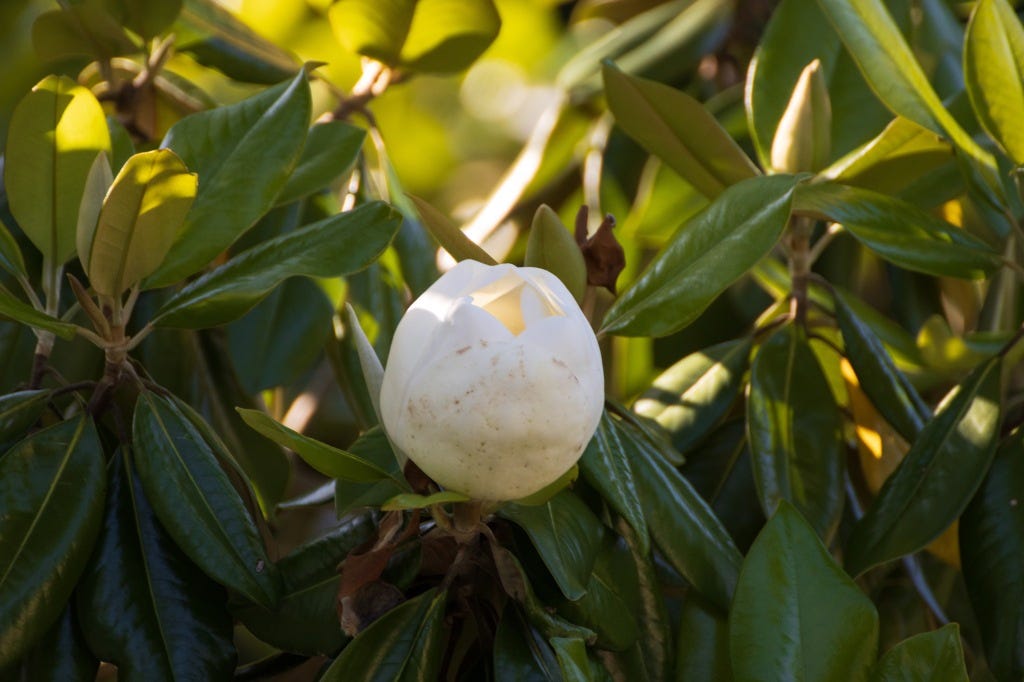BIAY - 2 Samuel - David and Magnolias
It feels a little bit later this year but our big Magnolia tree in our backyard is finally coming into bloom. The buds emerging and then finally opening into the giant, wide, brilliantly white blooms. I love seeing them emerge - they are not only a reminder of the season we are in but they also remind us that our beautiful tree is healthy. Because of the height of the tree, however, it is difficult for us to get close to any of the blooms so I am usually using my telephoto lens to draw in photos of them. From a distance, each bloom looks uniformly without blemish and similar in shape. But after zooming in, it becomes clear that each is unique. Each has echoes of the others but the way each opens is different and, through the long lens, you begin to see that there are different spots and blemishes on each of the flowers. But those are only seen when getting close.
The story of King David in the book of 2 Samuel is a lot like that. King David is often described as a “man after God’s own heart” and he is lauded as the victor over the Philistine giant, Goliath. His name is on more Psalms than anyone else and he is often lifted up as one of the Mt Rushmore faces of the Hebrew Testament. He shows tremendous grace and compassion in several circumstances throughout his life that are inspiring and beautiful. So, from a distance, David is like the many blooms on our tree. But, get in a bit closer and one begins to see something else. All of those things I just shared are there, but there is also the horrific abuse of power, rape, and murder that took place with Bathsheba and Uriah. There is brutality by King David over his defeated opponents. (See 2 Samuel 8:2 for example) and the celebrating of the deaths of tens of thousands of opponents.
So...King David is...complicated. But so am I. So are you.
I was listening to the OnBeing podcast this morning with an interview with Dr. Naomi Rachel Ramen who shared what her grandfather told her was the Kabbalah’s story of the “Birthday of the World.” She shared:
In the beginning, there was only the holy darkness, the Ein Sof, the source of life. And then, in the course of history, at a moment in time, this world, the world of a thousand thousand things, emerged from the heart of the holy darkness as a great ray of light.
And then, perhaps because this is a Jewish story, there was an accident. [laughs] And the vessels containing the light of the world, the wholeness of the world, broke. And the wholeness of the world, the light of the world, was scattered into a thousand thousand fragments of light. And they fell into all events and all people, where they remain deeply hidden until this very day
Now, according to my grandfather, the whole human race is a response to this accident. We are here because we are born with the capacity to find the hidden light in all events and all people, to lift it up and make it visible once again, and thereby to restore the innate wholeness of the world. This is a very important story for our times, that we heal the world one heart at a time. And this task is called “tikkun olam,” in Hebrew — “restoring the world.”https://onbeing.org/programs/rachel-naomi-remen-how-we-live-with-loss/#transcript
I loved that and I loved Dr. Remen’s quote after when she said,
I think that we all feel that we’re not enough to make a difference, that we need to be more, somehow — either wealthier or more educated or, somehow or other, different than the people we are. And according to this story, we are exactly what’s needed. And to just wonder about that a little, what if we were exactly what’s needed? What then? How would I live if I was exactly what’s needed to heal the world?
What if we were willing to see the blemishes and the perfection. The broken fragments and the fragments of light that exist in each of us? What if we could hold those together and not separate them. What if we can celebrate the beauty of each bloom exactly as it is and not be disappointed when we get close and see the spots and the blemishes?
I feel like that’s what I love about the Jesus story. That’s what I see Jesus do over and over. Jesus didn’t ignore the ways that people needed to change or pass over their brokenness but he held that at the same time as holding their unique beauty as children of God.
Dr. Remen shared that all of this is ultimately about “Tikkun Olam”...the restoration of the world.


